
What audiovisuals and technical devices should be used in EFL teaching?�
audiovisuals and technical devices in EFL teaching
Level: advanced
Age: 14-17
Downloads: 19
|
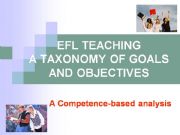
EFL Teaching a taxonomy of goals and objectives
SIX BASIC APPROACHES TO INTEGRATION
Action-based and action-driven teaching
Systemic teaching
Methodologies-based teaching
Concept and issue-based teachingepisteme)
Metoconcept-based teaching
Anthropological teaching
MODERN REQUIREMENTS TO
LESSON AIMES, GOALS AND OUTCOMES
Communicative s...
Level: advanced
Age: 14-17
Downloads: 25
|
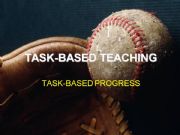
TASK-BASED TEACHING
Approaches to tasks classification
Do they teach to understand language use? - Informational
Do they teach to make effective use of language items? � Operational
Do they motivate the use of language for communication? � Motivational
Do they focus on form? � Non-communicative
Do they focus on...
Level: advanced
Age: 18-100
Downloads: 45
|
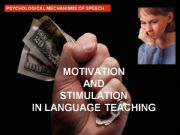
Motivation and stimulation in language teaching
From motivation and stimulation parameters
of speech generation and reception to EFL teaching principles
Motivate any utterance (passive or active)
In case of no real-life motivation, suggest role-playing strategies
State the aim clearly in communicative terms.
Not necessary to explain the mo...
Level: advanced
Age: 14-17
Downloads: 50
|
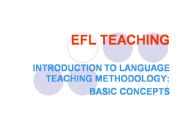
EFL Teaching
INTRODUCTION TO LANGUAGE TEACHING METHODOLOGY:
BASIC CONCEPTS
Level: advanced
Age: 14-17
Downloads: 56
|

The use of informational technologies at early stages of studying the Japanese language
The use of informational technologies at early stages of studying the Japanese language
Level: advanced
Age: 14-17
Downloads: 1
|
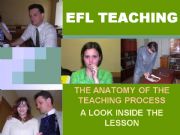
THE ANATOMY OF THE TEACHING PROCESS A LOOK INSIDE THE LESSON
Beginning � 400 words, BGS, BP, EVDT/S
Pre-Intermediate � 800-1000 words, BGS, EVDT/S
Intermediate � 1000-1500 words, CGS, MT/S
Upper-Intermediate � 1500-2000 words, CGS, MT/S
Advanced � 2000-2500 words, All GS, WET/S
Proficiency � more than 3000 words, All GS, AT/S
Sequencing and interrelat...
Level: advanced
Age: 14-17
Downloads: 47
|
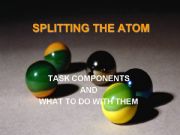
TASK COMPONENTS AND WHAT TO DO WITH THEM
TASK COMPONENTS
AND
WHAT TO DO WITH THEM
Level: intermediate
Age: 14-17
Downloads: 1
|
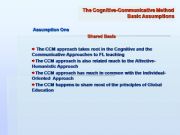
The Cognitive-Communicative Method�Basic Assumptions
Shared Basis
The CCM approach takes root in the Cognitive and the Communicative Approaches to FL teaching
The CCM approach is also related much to the Affective-Humanistic Approach
The CCM approach has much in common with the Individual-Oriented Approach
The CCM happens to share most of the...
Level: advanced
Age: 14-17
Downloads: 16
|
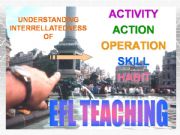
UNDERSTANDING INTERRELLATEDNESS OF ACTIVITY ACTION OPERATION SKILL HABIT
TEACHER MUST UNDERSTAND AND KNOW
how students remember and interpret rules and functions of language items
how to teach students to understand and use LI in oral and written communication
how to encourage conscious self-control of one�s speech activity
TEACHER MUST RELY ON
basic principles of s...
Level: advanced
Age: 14-17
Downloads: 22
|